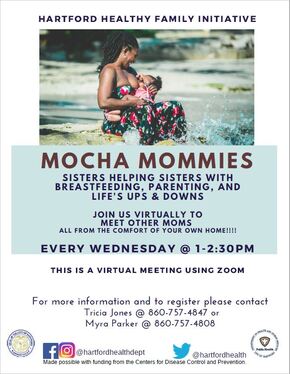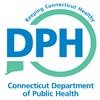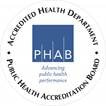Summer 2020

Welcome to the second edition of the Connecticut Department of Public Health's Breastfeeding: It's Worth It! quarterly eBulletin!
This eBulletin will help keep you abreast of current projects, opportunities, events, and outcomes related to breastfeeding promotion and support within our state.
National Breastfeeding Month, August 2020
August is National Breastfeeding month! This year the theme is Many Voices United. We are pleased to join with the United States Breastfeeding Committee and partners across the country working together to ensure that ALL families who want to breastfeed/chestfeed* their babies have access to a landscape of support along the way. Too often it is the opposite. Stereotypes, implicit biases and structural racism create hurdles that Black, Indigenous and People of Color as well as Transgender people must leap over on their breastfeeding/chestfeeding journey. Together, Many Voices United, we can recognize those hurdles and work to dismantle them.
As well as the month-long theme, each week in August highlights a unique theme to bring attention to the many ways we can work together to support and promote breastfeeding/chestfeeding in our communities.
As well as the month-long theme, each week in August highlights a unique theme to bring attention to the many ways we can work together to support and promote breastfeeding/chestfeeding in our communities.
- Week 1 (August 1-7): World Breastfeeding Week: Support Breastfeeding for a Healthier Planet
- Week 2 (August 8-15): Native Breastfeeding Week
- Week 3 (August 16-24): Spotlight on Infant and Young Child Feeding in Emergencies
- Week 4 (August 25-31): Black Breastfeeding Week: Revive. Restore. Reclaim.
Our partners at the Connecticut Breastfeeding Coalition will be sharing posts on Facebook and using #ItsWorthItCT to link back to our Breastfeeding: It’s Worth It! campaign. Please help us share the images, links and information all month!
*The Department of Public Health and our partners are working to ensure our materials incorporate gender inclusive language and are in alignment with the the ILCA Style Guidelines for Written Professional Resources, developed by the International Lactation Consultant Association.
Continuing Education
National Breastfeeding Conference & Convening
Due to the pandemic, the 2020 National Breastfeeding Conference and Convening, (NBCC), was postponed to June 2021. But, several sessions are being offered for free, virtually, each Monday in August. See the full list of topics and presenters on the USBC website.
Due to the pandemic, the 2020 National Breastfeeding Conference and Convening, (NBCC), was postponed to June 2021. But, several sessions are being offered for free, virtually, each Monday in August. See the full list of topics and presenters on the USBC website.

Webinar Series, Free CEU/CERPS
We are proud to announce the Connecticut Department of Public Health and the Connecticut WIC Peer Counseling Program are partnering with the Michigan Breastfeeding Network and its collaborators to present the Great Lakes Breastfeeding Webinars (GLBW). The FREE GLBW launches every third Tuesday of the month at 8am EST.
The planning and implementation of these webinars are grounded in this working definition of racial equity: "Disparities in breastfeeding are perpetuated by inequities that have historically and currently centered white people and their experiences. Racial equity in breastfeeding is both a process and an outcome. The process of working towards racial equity in breastfeeding involves purposefully decentering white supremacy and colonialism, including the notion that whiteness is the standard of normalcy, beauty, superiority, and centrality in our society. This process involves trusting Black and Indigenous families, elevating their voices, and investing in their communities. The outcome of racial equity is the adoption of breastfeeding-supportive policies and practices that eliminate negative health outcomes caused by systemic racism and realized when the social construct of race is no longer a predictor of breastfeeding outcomes." -Michigan Breastfeeding Network
These webinars are designed to support practice change among peer counselors, maternity care nurses, and home visitors. In providing these webinars, we are committed to 4 core values: access, evidence, equity, and relevance. You can register for the FREE webinars here. Each webinar provides 1-hour of continuing education credits for lactation practitioners.
We are proud to announce the Connecticut Department of Public Health and the Connecticut WIC Peer Counseling Program are partnering with the Michigan Breastfeeding Network and its collaborators to present the Great Lakes Breastfeeding Webinars (GLBW). The FREE GLBW launches every third Tuesday of the month at 8am EST.
The planning and implementation of these webinars are grounded in this working definition of racial equity: "Disparities in breastfeeding are perpetuated by inequities that have historically and currently centered white people and their experiences. Racial equity in breastfeeding is both a process and an outcome. The process of working towards racial equity in breastfeeding involves purposefully decentering white supremacy and colonialism, including the notion that whiteness is the standard of normalcy, beauty, superiority, and centrality in our society. This process involves trusting Black and Indigenous families, elevating their voices, and investing in their communities. The outcome of racial equity is the adoption of breastfeeding-supportive policies and practices that eliminate negative health outcomes caused by systemic racism and realized when the social construct of race is no longer a predictor of breastfeeding outcomes." -Michigan Breastfeeding Network
These webinars are designed to support practice change among peer counselors, maternity care nurses, and home visitors. In providing these webinars, we are committed to 4 core values: access, evidence, equity, and relevance. You can register for the FREE webinars here. Each webinar provides 1-hour of continuing education credits for lactation practitioners.
Contact Marilyn Lonczak if you have questions. We are working to identify more continuing education opportunities for our breastfeeding support community.
Healthcare
|
Congratulations to Connecticut’s 11th Baby-Friendly Hospital
The Department would like to congratulate and celebrate the staff of Backus Hospital for achieving the Baby-Friendly Hospital Designation in October 2019. Backus hospital became Connecticut’s 11th “Baby-Friendly” facility. A celebration was planned for this March, but the COVID pandemic interrupted those plans. We hope to celebrate later this year once the phased reopening is further along. The Baby-Friendly Hospital Designation promotes the Mission of Backus Hospital: “to improve the health and healing of the people and communities we serve.” Breastfeeding supports optimal health for babies that extends throughout their entire lives.
Families delivering at Backus that choose to breastfeed should expect to receive the following during their hospital stay:
|
The Department acknowledges the significant time investment this Designation process demanded and will continue to demand of you. We believe this investment is critical to ensure the moms you serve hear the message that “Breastfeeding: It’s Worth It!”, and with your support their investment in breastfeeding will lead to a stronger, healthier Connecticut.
|
Please contact, Lactation Consultant Kara Giroux RN, BS, IBCLC, ANLC (860-823-6569 or
[email protected]) for more information about lactation support services at Backus Hospital.
[email protected]) for more information about lactation support services at Backus Hospital.
Community Support

A major goal within the CDC-funded SPAN grant work is improving community breastfeeding support, especially for Black families. We are pleased to highlight some of the work being conducted by our partners in New Haven and Hartford who have been awarded CDC-funded Racial and Ethnic Approaches to Community Health (REACH) grants.
Hartford
Hartford Healthy Families Initiative sponsors Mocha Mommies: Sisters helping sisters with breastfeeding, parenting, and life's ups & downs. Meet over Zoom every Wednesday 1:00-2:30PM. For more information please contact Tricia Jones @ 860-757-4847 or Myra Parker @ 860-757-4808.
New Haven
In New Haven, CARE (Community Alliance for Research and Engagement) supports the newly formed New Haven Breastfeeding Task Force that is taking on a few initiatives around racial equity and breastfeeding in the New Haven Area. For more information on joining the meetings please contact Amelia Reese Masterson.
Hartford
Hartford Healthy Families Initiative sponsors Mocha Mommies: Sisters helping sisters with breastfeeding, parenting, and life's ups & downs. Meet over Zoom every Wednesday 1:00-2:30PM. For more information please contact Tricia Jones @ 860-757-4847 or Myra Parker @ 860-757-4808.
New Haven
In New Haven, CARE (Community Alliance for Research and Engagement) supports the newly formed New Haven Breastfeeding Task Force that is taking on a few initiatives around racial equity and breastfeeding in the New Haven Area. For more information on joining the meetings please contact Amelia Reese Masterson.
If you have community breastfeeding initiatives you would like to see highlighted in the next newsletter, please contact Jennifer Vinci.
Workplace Lactation Accommodation
Although Connecticut has somewhat protective breastfeeding legislation when compared to other states in the US, disparities persist. We know that one of the most challenging experiences on a parent’s breastfeeding journey is managing the return to work, as many struggle to access even simple workplace accommodations. The COVID-19 crisis has only exacerbated the difficulty employees face to gain breastfeeding accommodations at their worksite.
The Center for WorkLife Law, a research and advocacy organization at UC Hastings College of the Law that seeks to advance gender and racial equity in the workplace and in higher education has compiled tools that parents can use to request COVID accommodations. Click here for more details.
Additionally, the WorkLife Law webpage has authored a report on the state of lactation accommodations in the United States as well as providing resources for parents returning to work. Click here for more details.
Share Your Stories
The Connecticut Breastfeeding Coalition would like to hear your worksite success stories. Please share your stories on the It’s Worth It website.
The United States Breastfeeding Committee is gathering stories specific to how the COVID-19 pandemic is impacting infant feeding in our country. Stories will help “illuminate our nation's most pressing infant and young child feeding needs during the pandemic.” Click here to share your stories.
The Center for WorkLife Law, a research and advocacy organization at UC Hastings College of the Law that seeks to advance gender and racial equity in the workplace and in higher education has compiled tools that parents can use to request COVID accommodations. Click here for more details.
Additionally, the WorkLife Law webpage has authored a report on the state of lactation accommodations in the United States as well as providing resources for parents returning to work. Click here for more details.
Share Your Stories
The Connecticut Breastfeeding Coalition would like to hear your worksite success stories. Please share your stories on the It’s Worth It website.
The United States Breastfeeding Committee is gathering stories specific to how the COVID-19 pandemic is impacting infant feeding in our country. Stories will help “illuminate our nation's most pressing infant and young child feeding needs during the pandemic.” Click here to share your stories.

Congratulations Capital Community College!
On March 6, 2020 Capital Community College in Hartford opened a Lactation Space for Students, Staff and Faculty. Located within the Equity Center, the new Lactation Room offers a comfortable, private space for all those within the Capital Community College family to breastfeed or pump/express milk for their babies.
Resources and Research
COVID-19 and Infant Feeding
Having accurate, up-to-date information about infant feeding during the COVID-19 pandemic is important. The United States Breastfeeding Committee has catalogued a myriad COVID-19 resources into a straightforward listing. Information changes rapidly, so be sure to check reference links often to ensure you have the most updated resources.
Having accurate, up-to-date information about infant feeding during the COVID-19 pandemic is important. The United States Breastfeeding Committee has catalogued a myriad COVID-19 resources into a straightforward listing. Information changes rapidly, so be sure to check reference links often to ensure you have the most updated resources.

Certified Lactation Counselor training attendees, Summer 2019
This eBulletin is produced in collaboration with a variety of stakeholders with funding from the Centers for Disease and Control and Prevention’s (CDC) State Physical Activity and Nutrition (SPAN) Program. DPH is funded by SPAN to implement breastfeeding promotion and support activities in healthcare, communities and workplaces through 2023.
If you have received this link from a friend or colleague, please subscribe below:
The Connecticut State Physical Activity and Nutrition Program is made possible with funding from the Centers for Disease Control and Prevention (CDC). The views expressed in this eBulletin do not necessarily reflect the official policies of the CDC or imply endorsement by the U.S. Government. Learn more about the State Physical Activity and Nutrition Program at https://www.cdc.gov/nccdphp/dnpao/.



